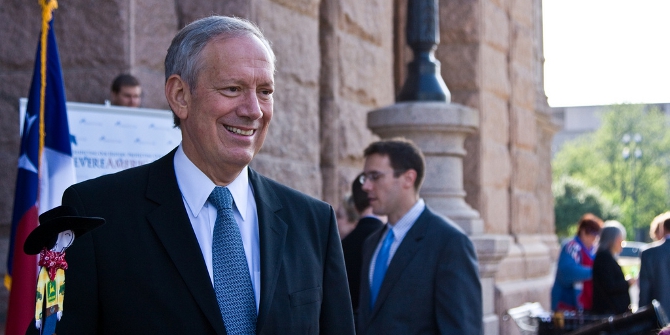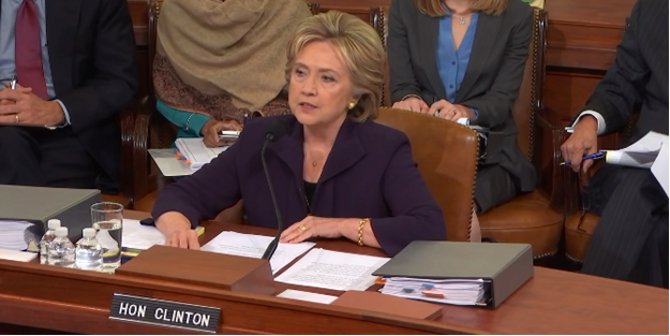 Last week saw the controversy over vaccines escalate to the 2016 presidential hopefuls, with Republican Senator Rand Paul (KY) stating that vaccination is a personal decision, and Hillary Clinton making a strong stand in favor. Richard Brodsky argues that Clinton’s position as the presumptive Democratic presidential nominee gives her the freedom to stake out a political position. Rand Paul, on the other hand, finds himself amongst a wide Republican field and so must tilt his comments to play to his party’s base.
Last week saw the controversy over vaccines escalate to the 2016 presidential hopefuls, with Republican Senator Rand Paul (KY) stating that vaccination is a personal decision, and Hillary Clinton making a strong stand in favor. Richard Brodsky argues that Clinton’s position as the presumptive Democratic presidential nominee gives her the freedom to stake out a political position. Rand Paul, on the other hand, finds himself amongst a wide Republican field and so must tilt his comments to play to his party’s base.
The intersection between American medicine and politics regularly produces strange and instructive phenomena. AIDS funding, Obamacare, Ebola quarantines, you name it. Hillary Clinton and Rand Paul are now nose-to-nose on the theory and practice of childhood vaccinations. It’s a classic example of how a grassroots political uproar finally reaches the political class. The decision of a significant number of parents not to vaccinate their kids bumped into a significant measles outbreak. The issue went from supper table conversation, to editorial outrage, and now has been embraced by the 2016 presidential contenders.
It’s all in how you frame the issue. For Senator Paul, it’s not about best medical practices; it’s about “freedom.” “While I think it’s a good idea to take the vaccine, I think that’s a personal decision for individuals.” “The state doesn’t own your children. Parents own the children.”
For Hillary it’s about respecting the science and not letting ideology get in the way. “The science is clear: The earth is round, the sky is blue, and vaccines work. Let’s protect all our kids. “Grandmothers Know Best” she tweeted.
The science is clear: The earth is round, the sky is blue, and #vaccineswork. Let's protect all our kids. #GrandmothersKnowBest
— Hillary Clinton (@HillaryClinton) February 3, 2015
This divide has the same ideological and political undercurrents that currently affect hosts of issues. Tea Party/Libertarian doctrine focuses on the role of the state in deciding things that should be left to individuals. (By the way, no American law forces children to be vaccinated; You just can’t go to school without them). It has put Senator Paul in a variety of interesting positions on marijuana, abortion, Obamacare, and gun laws. And whether you share the movement view or not, it’s a respectable perspective that often crosses ideological divides: Remember that the key argument against abortion restrictions is personal liberty and overweening state interference in a woman’s reproductive decisions.

The political response was quick in coming. Hillary moved swiftly and surely. She dismissed the medical concerns of the anti-vaccinators, and focused on the health of all children, with good science in her corner. We’re in this together for all our kids. It Takes A Village, after all.
She could do this because she enjoys an enormous intrinsic political advantage over every Republican hopeful. She’s the presumptive Democratic nominee, whose popularity within the Democratic Party makes it unlikely she’ll be seriously challenged for the nomination. Sen. Paul et al are fighting tooth and nail to secure the support of the Republican base, which is way to the right of the general election electorate. So Hillary could stake out a political position that will help her in the general election, while Senator Paul struggles to secure the sometimes wacky Republican base voter. Hillary, the Sensible Grandmother; Rand Paul and others jumping through hoops to become the avatar of the RightyRights.
This will happen repeatedly. Again and again we will see the Republican contenders dragged down by their need to keep the base happy. Again and again Hillary will be the voice of reason and responsibility: It’s about science and rational decision-making. On climate change, on evolution, on guns. And then on Obamacare, immigration and austerity economics. These people live in a fantasy world and can’t be trusted, she’ll say.
For the persuadable middle, this argument has weight. There’s no quick reply for Republicans that will counter it, without angering the GOP primary voter.
As an aside, this kind of conversation has the unfortunate consequence of making nuance and intellectual challenge harder to sustain. The scientific consensus on vaccinations is overwhelming. They work and the dangers are minimal. But there are examples of establishment medical pronouncements turning out to be wrong. It is decidedly not a bad thing for parents or patients to ask questions and make the best decision they can. So vaccinate your kids. But don’t ever feel that the American Medical Association or the government are always right. A little skepticism about any medical issue, and a concern for defining when government can coerce and when not, these are good things too.
Reps and Dems will continue to fence about these issues, which is helpful to all of us. But the practical fallout from this kind of debate is to make Hillary even more inevitable. If that’s possible.
Featured image: Senator Rand Paul (R-KY), Credit: Stumpsource.org (Flickr, CC-BY-NC-SA-2.0)
A version of this article first appeared at the Huffington Post.
Please read our comments policy before commenting.
Note: This article gives the views of the author, and not the position of USApp– American Politics and Policy, nor of the London School of Economics.
Shortened URL for this post: http://bit.ly/16L4e5O
_________________________________
 Richard Brodsky – Demos & NYU Wagner
Richard Brodsky – Demos & NYU Wagner
Richard Brodsky served 14 terms as a New York State Assemblyman, retiring in 2010. He is currently a Senior Fellow at Demos, a progressive think tank in New York City, and a Senior Fellow at New York University’s Wagner School of Public Administration. His years of public service focused on government reform, environmental protection and economic policy. He is also a lawyer and a journalist. Follow Richard Brodsky on Twitter: www.twitter.com/richardbrodsky.






